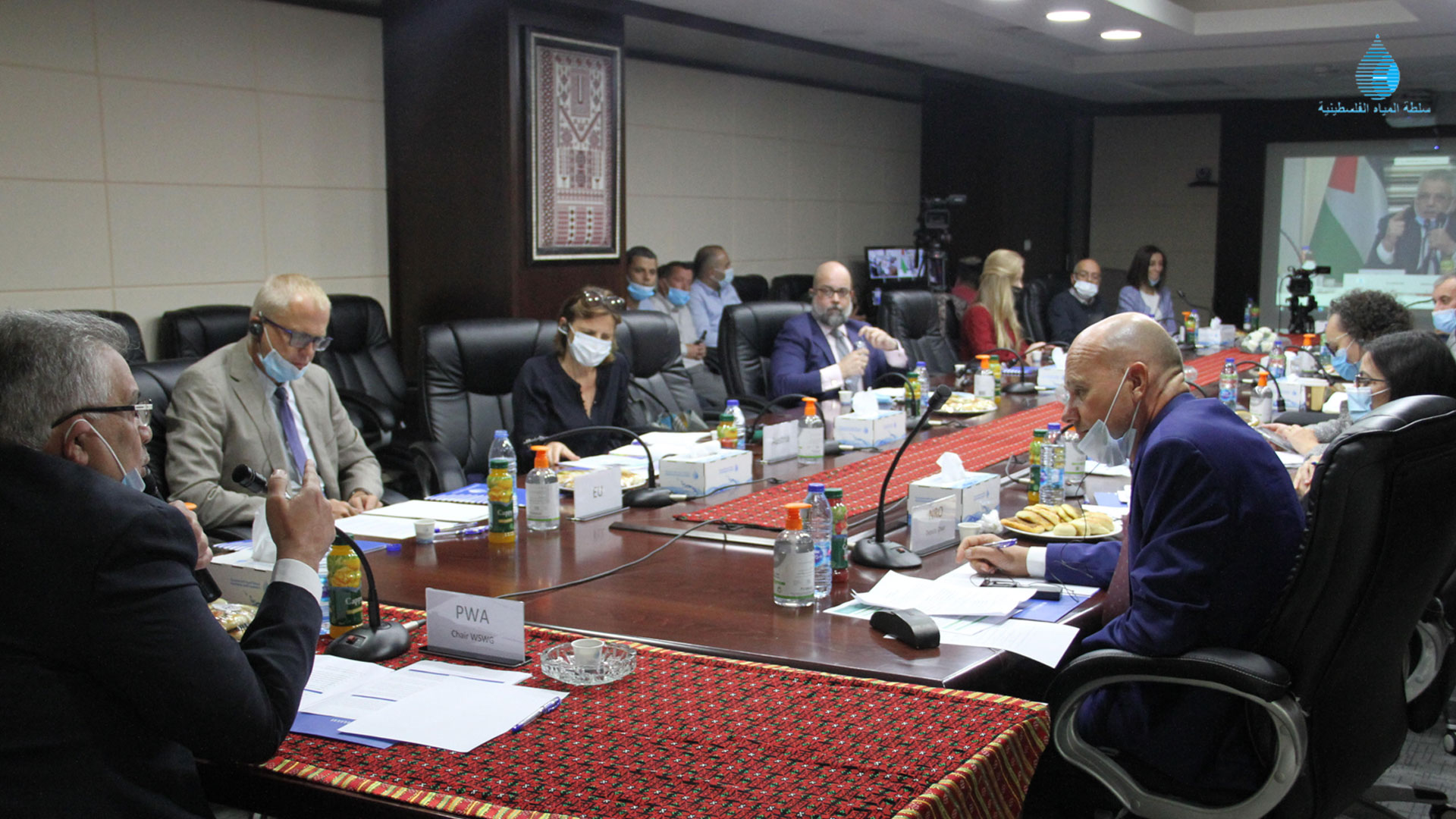Ramallah - Head of Water Authority, Eng. Mazen Ghunaim opened the regular meeting of the sectoral working group working in the water sector, in the presence of international donors, United Nations organizations, ministries of members of the group, and partners from civil society. The meeting comes within the framework of the Water Authority’s efforts to cooperate and communicate with all partners and keep them updated on the latest developments in the water and wastewater sector, in addition to presenting the existing challenges to projects and programs, in accordance with the principle of partnership and transparency pursued by the Water Authority.
Eng. Ghunaim opened his speech by emphasizing the exceptional situation and the forceful circumstances imposed on the Palestinian people from the intensification of political moves and the accompanying them of the deal of the century, and the threats of annexation plans, in parallel with the high rate of escalation of the occupation and its daily violations, in conjunction with the Corona pandemic, which imposed great burdens on the Palestinian government.
Eng. Ghunaim pointed to the close link between water and health security, especially in light of the escalation of the Coronavirus, as the provision of safe drinking water is the most important factor in combating the pandemic, and it is the main engine for all development sectors and the basis for achieving food security. The Water Authority has worked in cooperation with its partners, to counter the spread of the Covid virus by forming an emergency committee to deal at the national level, and developing an emergency precautionary plan, through which many goals were achieved through raising the readiness to follow up, work and communication between the Water Authority and partners to reduce the risks related to the availability of water and wastewater service, as well as rapid response to address any emergency, and follow-up of the continuity of operation of all water facilities to ensure the sustainability of water services, by providing the necessary materials and following up all operation and maintenance work, intensifying the processes of monitoring the quality of drinking water, taking precautionary measures, and coordinating and following up the efforts and interventions of service providers in particular.
Eng. Ghunaim also stressed the importance of strengthening the partnership to implement the programs and projects emanating from the reform at the institutional and infrastructure levels, as an essential pillar for implementing the reform and achieving the goals that all strive for, which requires the urgent provision of the necessary technical support, in addition to the importance of developing an integrated and long-term development program to support the process of reform and construction of facilities, as without an effective partnership and the availability of the necessary support, it will not be easy to implement reform and achieve its objectives.
Minister Ghunaim also called on the partner countries to activate the role of advocacy and provide political support for the water file in Palestine, especially since the development projects that are being implemented cannot be separated from the political situation, in light of the continuing Israeli violations, which require activating political diplomacy to pressure the Israel side, and advocating for inalienable Palestinian rights, which have been approved by international norms and laws, in addition to working to intensify efforts in the field of increasing existing support for projects in "C" areas, East Jerusalem and the Jordan Valley, including stopping the demolition of projects in areas classified C, rejecting the occupation and delaying approvals necessary for the entry of materials required for water installations in the West Bank and Gaza Strip.
During the meeting, the Israeli obstacles in the water and sanitation sector, which reflected negatively on the Palestinians were discussed, as the Palestinians' needs were addressed in terms of additional quantities of water and the importance of raising the capacity of Palestinian wells to be able to produce an additional 60 million cubic meters.
The presentation also shed light on Israeli piracy of Palestinian funds through unjustified deductions, including the deduction of funds under the pretext of cross-border water, and Israel’s prevention of Palestinians from establishing sanitation projects that the Palestinian government attaches great importance to ending environmental and health damage, and not allowing the Water Authority to implement vital projects, especially in Area C. This is at a time when Israel is implementing huge water projects in the West Bank aimed at separating the West Bank and turning them into small cantons to eliminate the idea of establishing a Palestinian state.
The participants were also briefed on the latest developments of the water sector reform program and the reform plan aimed at establishing capable and sustainable institutions within a legal framework. to carry out its responsibilities to the fullest extent, as well as to work on developing strategies, policies, and programs for water and sanitation the design and implementation of projects to achieve fair service provision to citizens, and achieve the sustainability of water resources.
The specialists were also informed of the central desalination plant project in the Gaza Strip and the practical steps that the Water Authority takes in the implementation process, which will be implemented based on the financial commitments of all donors towards the project to advance the operational steps of the program.
